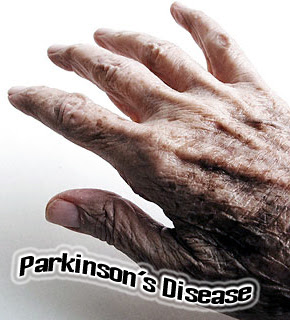 |
| illustration |
Parkinson's disease is a neurodegenerative disease after Alzheimer's dementia second most. This disease has a very wide dimensions of symptoms that either directly or indirectly affect the quality of life of patients and their families. This disease can cause patients to experience movement disorders.
Motor signs of patients is often accompanied by depression, cognitive dysfunction, sleep disturbances, and autonomic dysfunction. This disease causes sufferers can not manage / withstand the movements that are not realized.
Parkinson's disease or Parkinson syndrome is a neurodegenerative disease / syndrome due to disturbances in the basal ganglia due to a decrease or absence of substantia nigra dopamine delivery to the globus palidus / neostriatum (striatal dopamine deficiency).
Parkinson's disease is a progressive neurodegenerative disease that is closely related to age. This disease has the characteristics of the degeneration of dopaminergic neurons substantia nigra pars pars kompakta, coupled with the inclusion intraplasma consisting of protein called Lewy Bodies. Neurodegenerative in Parkinson's also occur in other brain regions, including the locus ceruleus, raphe nuclei, nucleus basalis Meynert, hypothalamus, cerebral cortex, the motor nuclei of the cranial nerves, the autonomic nervous system.
Some things that can cause Parkinson's alleged are as follows:
.jpg) 1. Genetic
1. Genetic2. Exposure to toxins
3. Infection
4. Diet
5. Head trauma
6. Stress and depression
Parkinson's disease occurs when nerve cells or neurons in the brain called the substantia nigra die or become weak. Normally these cells produce a vital chemical in the brain called dopamine. Dopamine is a chemical that can conduct electrical signals between the substantia nigra and along nerve cell pathways that will help produce a smooth body movements. When approximately 80% of dopamine-producing cells damaged, the symptoms of Parkinson's disease will appear.
Symptoms of Parkinson's Disease Symptoms of this disease include:
- Trembling. Someone with Parkinson's disease at rest or activity to be experienced trembling. Arising shaking can occur in the hands, feet, jaw, or head.
- Stiffness. Patients will experience stiffness in the muscles, pain in the shoulders, neck, and joints making it difficult to move.
- Loss of reflexes postural. Patient will experience body balance disorders.
- Rigidity. This symptom refers to the inability to perform active movements. When it will run, play, walk through the narrow streets of people would be difficult weeks to do it.
- Nonmotor symptoms (not related to movement). These symptoms also occur in patients with Parkinson's disease among other sufferers feel pain, burning, tingling, loss of motivation, difficulty sleeping, or feeling the pressure. Most of these symptoms will worsen Parkinson's disease patients.
Treatment
Treatment in patients with Parkinson's disease aims to slow and inhibit the progression of the disease. This treatment can be done with medication and physical therapy such as walking therapy, sound therapy / speech and patients are expected to keep doing daily activities.
Some drugs given to people with Parkinson's disease:
- AnticholinergicsBenztropine (Cogentin), trihexyphenidyl (Artane). Useful to control the symptoms of Parkinson's disease. For smooth movement.
- Carbidopa / levodopaLevodopa is the main treatment for Parkinson's disease. Levodopa is converted in the brain into dopamine. These drugs reduce tremors, muscle rigidity and improve movement. Patients with mild Parkinson's disease I went back to normal activities. Carbidopa is given with levodopa to increase the effectiveness and reduce the side effects.
- COMT inhibitorsEntacapone (Comtan), tolcapone (Tasmar). To control motor fluctuations in patients taking the drug levodopa.
- Dopamine agonistsBromocriptine (Parlodel), pergolide (Permax), pramipexole (Mirapex), this drug is given at the beginning of treatment, and often added to improve the administration of levodopa to levodopa work or given later when the side effects of levodopa cause new problems.
- MAO-B inhibitorsSelegiline (Eldepryl), Rasagaline (Azilect). Useful for controlling the symptoms of Parkinson's disease. For smooth movement.
- Amantadine (Symmetrel) is useful for treatment of akinesia, dyskinesia, rigidity, tremor. In addition to drug therapy given, feeding should really be considered, because it can cause muscle stiffness sufferers have difficulty swallowing that could happen malnutrition (malnutrition) in patients. Fiber foods will help reduce digestive disorder caused by the lack of activity, fluids and some medication.



0 comments:
Post a Comment